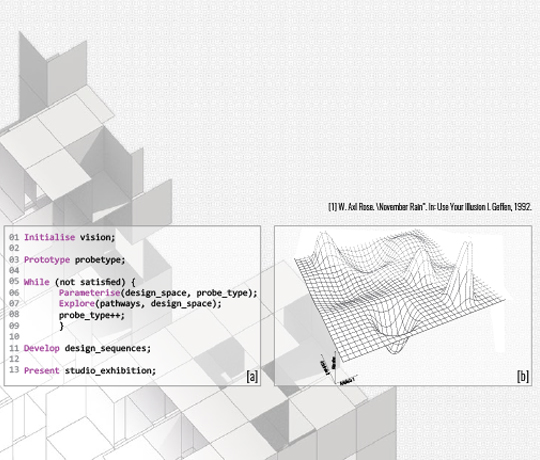Studio 35
Hacking Design
Transformation Through Adaptation
Dr. Fjalar de Haan and Camilo Cruz

Studio Description
Change is constant. As the poet put it: `Nothin' lasts forever / and we both know hearts can change' [1]. But design is something and that for is often considered to be frozen in time. We propose a studio in which design is for change, where participants learn an approach to design where a changing context is the starting point, where adaptation is a design criterion.
The case we propose makes a changing context intrinsic to the entire studio. Melbourne has been witnessing a growing homelessness problem --- an issue much broader and deeper than people sleeping in the streets. Without assuming in advance what these people need or want, we do think their situation requires imrovement. Can design help? What do we envision the future to be with respect to this issue? We are after design that permanently changes the situation. But what of the design once this has happened? We are after design that can adapt to the changing situation. And change happens in many ways, can we design for all the possible futures?
We approach design from the perspectives of transitions studies and evolutionary design, thus understanding the dynamic character of both designed artefacts and their context. Our process begins with the generation of a vision, which is then probed, parameterised and explored, looking for those sequences of design that allow for adaptation to the changing context. Our goal is to devise methods to produce artefacts, and explore the possible trajectories they could follow, in their journey to serve human life. In this view, each design opens up possible futures and closes off others. Designing for change then means to open up many and close off few.
Using a systematic approach, participants are prompted to generate design spaces and explore the pathways these spaces allow them to follow, in search of revealing and understanding the transient nature of designed artefacts.
With the help of digital media, participants are expected to produce a catalogue of artefacts capable of communicating the trajectory they intend to follow, in order to supersede their original vision with one capable of adapting to the ever-changing conditions of human environments. Designing transitions' general task will be to deal with the tension between homelessness and the formal infrastructure of the city in Melbourne. The premise is that `homeless' is a transient state, which requires transient infrastructure. However, once one stops being homeless, those infrastructures remain. Then, the question becomes, how can these structures adapt?
The studio will have five assignments, structured in order to enable the generation and evolution of a vision, via the exploration of possible pathways for the development of complex and adaptive inhabitable spaces. We aim for the design proposals to be context-sensitive and potentially implementable in the ‘real world’.
[1] W. Axl Rose. \November Rain". In: Use Your Illusion I. Geffen, 1992.
Studio Outcomes
Participants will familiarise themselves with the requirements of the project, as well as with the relevant concepts of transitions and evolutionary design.
Participants will be introduced to design as a complex endeavour that is not only about the object being produced, its practical and cultural implications, but also about how it fits into a larger system.
Participants will develop practical skills in parametric design and scripting, as tools for the generation and exploration of design spaces.
Studio Leaders
Fjalar de Haan is a theoretician with a keen interest in transformative change. He has an MSc in theoretical physics (Institute Lorentz, Leiden University) and a PhD in transitions studies (DRIFT, Erasmus University Rotterdam). His PhD thesis is titled ‘Towards Transition Theory’. He developed the Multi-Pattern Approach enabling systematic case analysis by breaking down transitions into sequences of patterns and led the development of the Societal Needs Framework, explaining how service-provision systems relate to needs. He is currently Lecturer – Sustainability Transitions with the Melbourne School of Design and an associate of the Melbourne Sustainable Society Institute both at The University of Melbourne.
Camilo Cruz is a full-time PhD researcher in evolutionary design and design theory at MSD. Before coming to Melbourne, Camilo served as full-time lecturer at the Faculty of Architecture and Urbanism of the Universidad de Chile (2012-2014), associate at Office of Adrian Phiffer and Normal, in Toronto, Canada, and as a design manager at Eliash Arquitectura y Urbanismo, a Santiago based architecture studio, focused on institutional, educational and urban design projects around South America.
Camilo received his Master of Urban Design from the University of Toronto (2011) and his bachelor and professional degrees in Architecture from Pontificia Universidad Catolica de Chile (2006).
ST1/35 Monday 9AM-12, MSD Room 216
ST2/35 Thursday 9AM-12, MSD Room 216